The way delivery services pay their drivers — often independent contractors and not employees — can complicate how you approach tipping and might even change how you provide gratuities.
With the gig economy in full swing, there are more people than ever helping to taking care of the mundane, whether it’s picking up dinner, providing a ride home, dropping off groceries and, in legal states, delivering cannabis. But what do about a gratuity? Here is a guide to tipping your delivery driver.
Many apps include the ability to add a tip to an order, in the same way a restaurant will have a line for an optional gratuity. Unfortunately, the way delivery services pay their drivers — often independent contractors and not employees — can complicate how you approach tipping and might even change how you provide gratuities.
RELATED: Millennials Are Terrible At Tipping And Here’s Why
The amount tipped can also vary regionally or by level of service. The general rule of thumb is to tip at least 15% at sit-down restaurants, although in some major US cities, 20 percent has become the new floor. The same rule-of-thumb can be used to tip ride-share drivers like Uber or Lyft. As independent contractors, these drivers are responsible for all of their expenses, and don’t get paid to drive to until they pick up their fares, if they came a long way to pick you up, considering a slightly better tip. For short rides, it might be more appropriate to tip 2-3 dollars instead of a percentage of the fare. Also keep in mind that many platforms not only allow customers to rate drivers, but also vice-versa.
Similarly, for food delivery, a percentage of your bill, or a few bucks for a small order, is generally considered an appropriate amount, with a little extra if drivers have to deliver in bad weather. But here’s where services like DoorDash and Amazon Flex make it a bit more complicated. Both services, as well as many others, guarantee a pay per order, but adjust how much they pay the driver, only covering the gap between tips and the guaranteed minimum. In other words, tips are more of a wage subsidy and less of a gratuity based on the quality of service. If the driver is on a platform with a similar pay system, and you want your “tip” to be a gratuity beyond the base pay, tip in-person, in-cash, upon delivery.
RELATED: Cheapskate: Here’s How Much Your State Sucks At Tipping
For cannabis drivers tipping can be also be complicated, depending on whether the driver is an employee of the dispensary or is a contractor similar to non-cannabis delivery. Fully employed drivers probably rely less on gratuities than gig drivers, something to possibly consider. It also wouldn’t be out of place to ask the driver how important tips are to them. In-store, it’s always nice to throw a couple bucks in the jar, how much depends on the level of service. The same rule-of-thumb for other tip jars generally applies for budtenders too.
Whether you love or hate tipping, it’s a custom well-intrenched in our culture, and for many of those that make life more convenient, those gratituties are an important component of their livelihood, and few would want good service to go under compensated.


